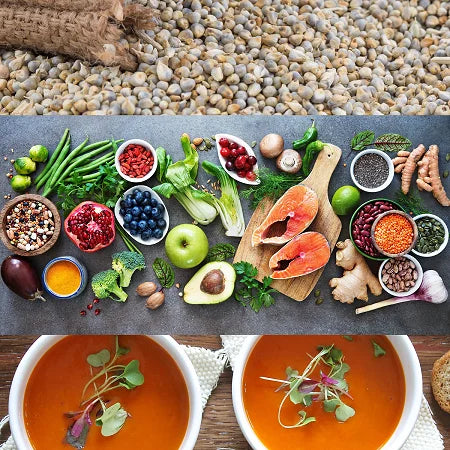
Shorter days and colder temperatures do not just mean a change for our body on the outside, but on the inside too. It’s not just our clothes and dressing style that changes in winters, our metabolism, food choices and hunger cues are all affected by the weather.
Studies have shown that metabolism speeds up in winter; this is associated with increased hunger and a craving for comfort foods. You might have noticed people often complaining that they eat more during winters, turns out it is true.
Winter comes with its own set of viral infections and flu. Especially in these Covid times we have seen how the disease and cases tend to spike every winter.
All these changes mean we should be changing our diet accordingly too, to incorporate more calorie dense food to match the boost in metabolism. We also require micronutrient rich foods that will help boost immunity and reduce the chances of catching infections.
Let’s take a look at what foods should be included in the diet during winters:
Soups :
Traditionally in many cultures dinner in winters is a hot broth or soup using various seasonal vegetables to provide the much needed warmth to the body.
A soup made with chicken/meat and vegetables with some herbs and spices. It is a great way to include fibre in the diet along with some warmth to your days.
Vit D rich foods :
The days are shorter, there is less sunlight and the exposure to the sun is less, which means less Vit D from the environment and more from the diet.
Vit D rich food like eggs, salmon, milk, curd, mushrooms, oranges and fortified cereals or milks should be a part of daily winter diet.
Nuts and seeds :
Dry foods have traditionally been a winter delicacy because they are powerhouses of nutrients. Almonds, walnuts, pumpkin seeds, sesame seeds etc are great sources of calcium, magnesium and various minerals. They are also calorie dense and a great snack to munch on in winters.
Root vegetables :
Root vegetables are calorie dense and a concentrated source of energy. Sweet potato is packed with Vit A that helps build immunity.
Cereals & Grains :
Cereals and whole grains are a great source of fiber as movement during winter is limited.
A great cereal to switch to during winters is bajra, it’s a winter millet and high in nutrients like magnesium.
Citrus Fruits :
Seasonal citrus fruits like mandarins, oranges, sweet lime are all power packed with Vit C. Vit C is the most important Vitamin needed to fight infections and boost your immunity to prevent flu during the winters.
Ghee :
Ghee is rich in omega 3, Vit A and is a great food for boosting immunity. Traditionally ghee and nuts are combined together to make ladoos and halwas that are consumed throughout the winters to boost energy.
Jaggery:
Jaggery is packed with micronutrients and can be used instead of sugar to get that sweet taste along with the benefits of nutrients.
Herbs or herbal tea:
A herbal tea can be made out of fresh turmeric, ginger, mint, peppercorn, cinnamon to be sipped throughout the day to provide warmth and also to boost immunity in the winter season.
Spices:
Peppercorns, cinnamon, star anise, nutmeg are some of the favorite winter foods, a pinch over tea or coffee or adding them in the food can give you the much needed boost to metabolism that can keep the body producing heat from within.
Conclusion:
Even though today we have the facility of the AC or the heater to tweak the temperature to your linking, there is much wisdom to be learnt from how our ancestors changed their diets during seasons.
Your body and circadian rhythm changes and your diet should too to support it.
The goal of winter foods is to provide constant nourishment to keep the body warm and the energy and the immunity to fight the cold and infections that come with the cold.
Also, check out our online pickle shop for a delectable range of homemade Indian pickles.
